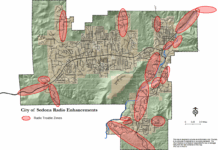Sedona has hundreds, nay, thousands of units of affordable housing, all built because numerous Sedona City Councils required new builders of housing developments, hotels, resorts and other lodging facilities to pay into the city’s affordable housing fund.
The city of Sedona then used all those funds to build these apartment complexes, affordable housing units and housing developments for Sedona’s working class to ease their commute rather than forcing most of our city’s workforce to find housing in other communities like Cottonwood, Cornville or the Village of Oak Creek.
Forcing all our workers to commute? That would just be silly. Providing no housing options for working families? Ridiculous, I say.
Certainly our city leaders over the decades have had the foresight to mandate these new businesses pay the city rather than force them to build units — can you imagine forcing developers to build low-rent units on their own properties? Absurd! — then using those funds to build units and provide homes for our residents.
The city of Sedona could have mandated that these developments help Sedona’s housing crisis with brick and mortar, but instead council after council filled mainly with retirees and not business owners or working people asked for a cash handout.
The developer looks like a good guy for paying the extortion … sorry … “fee,” and the city can add more to its coffers and claim that the unused fund is benefitting Sedona’s working families.
Yet no new housing units actually get built and Sedona’s workforce has nowhere to live. The city hasn’t actually spent these millions collected for affordable housing, so workers and families, promised that the city would force developers to help with our housing shortage, see zero benefit.
Now the city has extended this magical strategy from housing to parking.
Fantastic.
When a new business builds a building or occupies an old space and requires more parking — e.g. a restaurant needs more parking spots than a real estate office in the same building — generally towns and cities mandate that the new business build more parking spots or buy parking spots from neighboring businesses.
In an ideal world, this strategy is supposed to prevent a district, like Sedona’s Uptown, from suddenly finding itself lacking a handful, then dozens, then hundreds of parking spaces.
Long short of parking spots, the city of Sedona is now using taxpayer dollars to buy land and build a parking garage off Forest Road for the low, low price of $11.5 million.
Plus $800,000 for the land.
Needed? Sure, but only because previous mismanagement by city administrators and city councils created a dearth of parking spots over years, necessitating a parking garage now.
This new policy means parking garage No. 2 will be inevitable because the city would rather take payoffs than mandate new businesses build enough parking spots for their customers spread around the city.
Instead of profit-seeking businesses building their fair share when they open, the city will wait years before being forced by sheer necessity to finally build another parking structure — at taxpayer expense — to alleviate a problem the city itself caused.
While West Sedona residents may dismiss parking as an Uptown-only problem, the new policy has ripple effects throughout the city.
Perhaps the city will build the next parking garage in West Sedona and bus tourists to Uptown.
The policy is limited to the Uptown Sedona Business District for now, but revenue-generating city programs rarely stay confined. If the policy remains, it will expand. And when it does, and when those limited parking spots fill up in West Sedona, customers will look for parking on nearby residential streets, just like they do throughout Uptown. Or near trailheads. Or near city parks during festivals and events.
The city has shown that requiring in-lieu fees for city problems instead of concrete, brick and mortar solutions is ineffective and should end this practice because it does nothing to help residents; it just fattens the city’s budget.
Christopher Fox Graham
Managing Editor






















